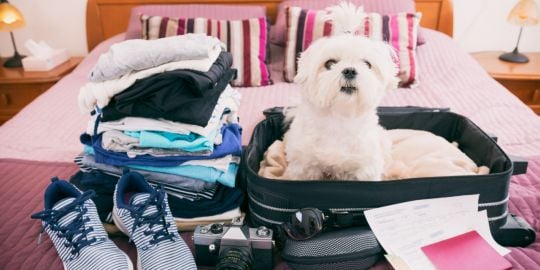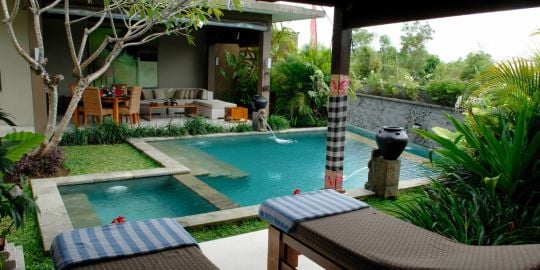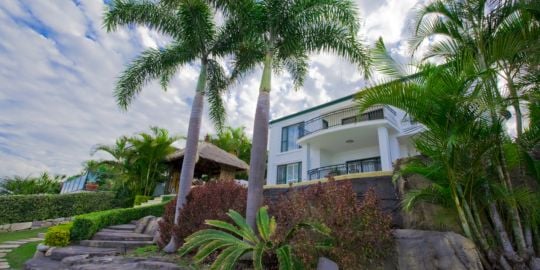This Ministerial Instruction shall come into force on the 26 July 2021 to 2 August
FIIRST
Governor of Bali and Regent/Mayor for Regency/City area with the following criteria:
1) Level 3 (three), namely Jembrana Regency, Bangli Regency, Karangasem Regency;
and
2) Level 4 (four) namely Badung Regency, Gianyar Regency, Klungkung Regency, Tabanan Regency, Buleleng Regency and Denpasar City
SECOND:
Determination of the regional level as intended in the FIRST Dictum guided by Indicators Adjustment of Public Health Efforts and Social Restrictions in Managing Pandemic COVID-19 as determined by the Minister of Health.
Adjustments are made to the agglomeration region in Greater Jakarta, Greater Bandung, Greater Semarang, Solo Raya, Special Region of Yogyakarta, Surabaya Raya and Malang Raya, where if the majority city/regency within 1 (one) agglomeration area is still at Level 4 (four), then the city other districts within the agglomeration area is not at Level 4 (four) then it will included in Level 4 (four).
THIRD:
PPKM in Regencies and Cities in the Java region and Bali with LEVEL 4 (four) criteria as referred to in the FIRST Dictum carried out by implementing activities as following:
a. implementation of teaching and learning activities (School, College, Academy, Place Education/Training is carried out regularly online/online;
b. implementation of activities in non-essential sectors enforced 100% (one hundred percent) Work From Home (WFH);
c. implementation of activities in the sector:
1) essential like
a) finance and banking only covers insurance, bank, pawnshop, stock exchange futures, pension funds, and institutions financing (oriented to physical service with customers )
b) capital market (which is oriented towards service with customers) and running of capital market operations
c) information and communication technology includes cellular operators, data centers, internet, post, media related to dissemination of information to the public;
d) non-quarantine handling hotels;
and
e) export-oriented industries and must show proof of example Goods Export Notification document (PEB) for the last 12 (twelve) months or other documents showing export plan and must have a permit Operations and Activity Mobility Industry (IOMKI),can operate with the following conditions:
a) for letter a) can operate with maximum capacity 50% (fifty percent) of staff for related locations with service to the community, and 25% (twenty five percent) for office administration services support operations;
b) for letter b) up to letter d) can operate at capacity maximum 50% (fifty percent) of staff;
and
c) for the letter e) can only operate 1 (one) shift with maximum capacity 50% (fifty percent) of staff only in production facilities/factories, as well as 10% (ten percent) for service office administration operational support,
2) essential in the government sector that provide public services that cannot delayed implementation apply 25%
(twenty five percent) maximum WFO staff with strict health protocols;
3) critical such as:
a) health;
b) security and order;
c) disaster management;
d) energy;
e) logistics, transportation and distribution especially for basic needs Public
f) food and drink as well as support, including for livestock/pets;
g) fertilizers and petrochemicals;
h) cement and building materials;
i) national vital objects;
j) national strategic projects;
k) construction (public infrastructure);
l) basic utilities (electricity, water and management rubbish), can operate with the following conditions:
a) for letter a) and letter b) can be operating 100% (one hundred percent) staff without any exceptions; and
b) for letter c) up to letter l) can operate 100% (one hundred percent) maximum staff, only on facilities production/construction/service to community and for service office administration operational support, enforced maximum 25% (twenty five percent) the maximum percent of WFO staff,
4) for supermarkets, people's markets, shops grocery and supermarket that sells daily necessities are limited by hours operational until 20.00 hours local with 50% visitor capacity (fifty percent); and
5) for pharmacies and drug stores can be opened for 24 (twenty four) hours,
d. People's market that sells non- daily necessities can operate with maximum capacity 50% (fifty percent)and operating hours until 15.00 time local;
e. street vendors, grocery stores, agents/outlets vouchers, barbershop/barbershop, laundry, hawkers, small workshops, laundry vehicles, etc. of the like are permitted open with strict health protocols until by 20.00 local time and the technical arrangement is carried out by Local government;
f. implementation of eating/drinking activities on the spot general:
1) food stalls/warteg, street vendors, hawker stalls and the like are allowed to open with strict health protocols until by 20.00 local time withmaximum visitors eat on the spot 3 (three) people and maximum meal time 20 (twenty) minutes. Technical arrangements are set by regional government;
2) restaurant/restaurant, cafe with location which is in a closed building/shop both in a separate location lokasi as well as those located in the center shopping/mall only accept delivery/take away and not receiving eat in (dine-in);
g. activities in shopping centers/malls/centers trade is opened with maximum capacity 25% (twenty five percent) up to 17:00 local time with taking into account the provisions in c.4 and f.2;
h. implementation of construction activities for public infrastructure (construction sites and project site) operating 100% (one hundred percent)by implementing health protocols more stringent;
i. places of worship (mosques, prayer rooms, churches, temples, Viharas, and temples and other places that are functioned as a place of worship), not holding religious/religious activities together during the implementation of PPKM and optimizing the implementation of worship at home;
j. public facilities (public areas, parks public, general tourist attractions and areas other public) is temporarily closed;
k. arts, culture, sports and social activities community (location of arts, culture, facilities) sports and social activities that can cause crowds and crowds) temporarily closed;
l. public transportation (public transportation, public transportation mass, taxis (conventional and online) and rental/rental vehicles) is enforced by maximum capacity setting 50% (fifty percent) by implementing health protocols more strictly;
m. the holding of the wedding reception will be canceled during the implementation of PPKM Level 4 (four);
n. domestic travelers who use private car, motorcycle and transportation long-distance general (airplane, bus, ship and trains) must:
1) show vaccine card (minimum first dose vaccination);
2) show H-2 PCR for aircraft
and Antigen (H-1) for transportation mode private car, motorcycle, bus, train and ships;
3) the provisions as referred to in number 1) and number 2) only apply to arrivals and departures from and to Java and Bali and does not apply to transportation within the agglomeration area for example for the Greater Jakarta area; and 4) for logistics vehicle drivers and other goods transportation is excluded from provisions for having a vaccine card.
o. keep wearing masks properly and Consistent when carrying out activities outside home and not allowed to use face shield without wearing a mask; and
p. implementation of PPKM at the RT/RW level, village/kelurahan and sub-district enforced by activating the Posko Posko at each level by looking at the area control zoning criteria.
FOURTH:
PPKM in Regencies and Cities in the Java and Bali with LEVEL 3 (three) criteria as follows referred to in the FIRST Dictum is carried out by implementing the following activities:
a. implementation of teaching and learning activities (School,
College, Academy, Place Education/Training is carried out regularly online/online;
b. implementation of activities in non-essential sectors enforced 100% (one hundred percent) Work From Home (WFH);
c. implementation of activities in the sector:
1) essential like
a) finance and banking only covers insurance, bank, pawnshop, stock exchange futures, pension funds, and institutions financing (oriented to physical service with customers);
b) capital market (which is oriented towards service with customers ) and running of capital market operations
c) information and communication technology includes cellular operators, data centers, internet, post, media related to dissemination of information to the public;
d) non-quarantine handling hotels;
and
e) export-oriented industries and must show proof of example Goods Export Notification document (PEB) for the last 12 (twelve) months or other documents showing export plan and must have a permit Operations and Activity Mobility Industry (IOMKI),can operate with the following conditions:
a) for letter a) can operate with maximum capacity 50% (fifty percent) of staff for related locations with service to the community, and 25% (twenty five percent) for office administration services support operations;
b) for letter b) up to letter d)can operate at capacity maximum 50% (fifty percent) of staff;
and
c) for the letter e) can only operate with the arrangement of 2 (two) shifts with maximum capacity 50% (fifty percent) staff for each shift only in production facilities/factories, as well as 10% (ten percent) for service office administration support operations, with implementing health protocols entry and exit arrangements as well employees cannot eat at the same time.
2) essential government sector that provide public services that can be postponed 25% (twenty five percent) maximum staff WFO with strict health protocols;
3) critical such as:
a) health;
b) security and order;
c) disaster management;
d) energy;
e) logistics, transportation and distribution especially for basic needs Public;
f) food and drink as well as support, including for livestock/pets;
g) fertilizers and petrochemicals;
h) cement and building materials;
i) national vital objects;
j) national strategic projects;
k) construction (public infrastructure);
l) basic utilities (electricity, water and management rubbish), can operate with the following conditions:
a) for letter a) and letter b) can be operating 100% (one hundred percent) staff without any exceptions; and
b) for letter c) up to letter l) can operate 100% (one hundred percent) maximum staff, only on facilities production/construction/service to community and for service office administration operational support, enforced maximum 25% (twenty five percent) percent of staff,
4) for supermarkets, people's markets, shops grocery and supermarket that sells daily necessities are limited by hours operational until 20.00 hours local with 50% visitor capacity(fifty percent); and
5) for pharmacies and drug stores can be opened for 24 (twenty four) hours,
d. People's market that sells non- daily necessities can operate with maximum capacity 50% (fifty percent) and operating hours until 15.00 time local:
e. street vendors, grocery stores, agents/outlets vouchers, barbershop/barbershop, laundry, hawkers, small workshops, laundryvehicles, etc. of the like are permitted open by implementing health protocols strict until 20.00 time local and technical arrangements are made by the Regional Government;
f. implementation of eating/drinking activities on the spot
general:
1) food stalls/warteg, street vendors, hawker stalls and the like are allowed to open with strict health protocols until by 20.00 local time with maximum diners eat 25% (two fifty five percent) of capacity and time eat a maximum of 30 (thirty) minutes. Subsequent technical arrangements are governed by Local government; and
2) restaurant/restaurant, cafe with location which is in a well-closed building/shop which are in separate locations or located in a shopping center/mall only accept delivery/take away and do not accept dine-in;
g. activities in shopping centers/malls/centers trade is opened with maximum capacity 25% (twenty five percent) up to 17:00 local time with taking into account the provisions in c.4 and f.2;
h. implementation of construction activities for public infrastructure (construction sites and project site) operating 100% (one hundred percent) and small scale construction is allowed maximum 10 (ten) people by implementing the protocol health more strictly;
i. places of worship (mosques, prayer rooms, churches, temples,Viharas, and temples and other places that are functioned as a place of worship)holding religious/religious activities together during the implementation of PPKM Level 3 (three) with a maximum of 25% (twenty five percent) capacity or 20 (twenty people) people by implementing health protocols more strictly;
j. public facilities (public areas, parks public, general tourist attractions and areasother public) is temporarily closed;
k. arts, culture, sports and social activities community (location of arts, culture, facilities) sports and social activities that cancause crowds and crowds) temporarily closed;
l. public transportation (public transport, mass transit, taxis (conventional and online) and rental/rental vehicles) apply with a maximum capacity setting of 70% (seventy percent) by applying more stringent health protocols;
m. the implementation of the wedding reception can be held with a maximum of 20 (twenty) invitations and not having a meal with implementing more strict health protocols
n. domestic travelers who use private car, motorcycle and transportation long-distance general (airplane, bus, ship and trains) must:
1) show vaccine card (minimum first dose vaccination);
2) show H-2 PCR for aircraft and Antigen (H-1) for transportation mode private car, motorcycle, bus, train and ships;
3) the provisions as referred to in number 1) and number 2) only apply to arrivals and departures from and to Java and Bali and does not apply to transportation within the agglomeration area for example for the Greater Jakarta area;
and
4) for logistics vehicle drivers and other goods transportation is excluded from provisions for having a vaccine card.
o. keep wearing masks properlyand Consistent when carrying out activities outside home and not allowed to use face shield without wearing a mask; and
p. implementation of PPKM at the RT/RW level, village/kelurahan and sub-district enforced by activating the Posko-Posko at each level by looking at the criteria territorial control zoning.
FIFTH:
The governor has the authority to transfer allocations vaccine needs from districts and cities that have excess allocation of vaccines to districts and Cities that lack vaccine allocations.
SIXTH:
Governors, Regents and Mayors prohibit any form of activity / activity that can cause a crowd.
SEVENTH:
Governors, Regents and Mayors coordinate and collaborating with TNI, Polri and Attorney General in the implementation of PPKM.
EIGHTH: Carry out tightening activities and education
with the following principles:
a. COVID-19 is most contagious in conditions of closed, long meetings (more than 15 minutes), close interaction, crowd, activity with strong breath for example singing, talking and laughing and don't wear a mask like when eating together;
b. proper use of masks and consistency is the most health protocol the minimum that everyone should apply;
c. wash hands with soap or hand sanitizer repeatedly, especially after touching things that other people touch (such as doorknobs or banisters), touching the face with hands is necessary avoided;
d. better type of mask, will be more protect (for example a surgical mask once wear better than cloth masks, and masks N95 is better than surgical mask). At the moment, the use of masks as much as 2 (two) layers is a good choice. Face mask should need to be replaced after use (>4 (more than four) hours);
e. implementation of health protocols is carried out taking into account the ventilation factor air, duration, and interaction distance, for minimize the risk of infection in active;
f. distance considerations can be applied as following:
1) do activities from home, and interact only with people who stay together;
2) if you have to leave the house, then you have to always strive for a distance of at least 2 (two) meters in interacting with other people. Reduce/avoid contact with other people who do not live in the same household; and
3) socialize various visual clues in public places related to prevention and handling COVID-19,
g. duration considerations can be applied as following:
1) if you have to interact with other people or attend an activity, done with a short duration for reduce the risk of transmission; and
2) in office and activity situations others, scheduling and rotation can be help to reduce duration interaction,
h. ventilation considerations can be applied as follows:
1) outdoor activities have risks much lower transmission compared to indoors; and
2) the room should always be strived for have good air ventilation. Open doors, windows can be done to reduce the risk of transmission. Where the door or window cannot be opened, then air purifier with High Efficiency Particulate Water (HEPA) filter can be used inside room,
i. in conditions of widespread transmission in community, then more stringent intervention by limiting people's mobility significant need to be done;
j. 3T strengthening (testing, tracing, treatment) is necessary to continue to apply:
Source: Instruction of the Minister of Home affairs No 24/2021
https://covid19.go.id/storage/app/media … Inmendagri PPKM Level 4 Jawa Bali No 24 Tahun 2021.pdf?fbclid=IwAR3S66Q4tjgtL_d2SrwnOGjWLjfsBP01HRYQjkf9QwN6-nsCMBhDiW6jzDw
Implemention of PPKM for areas level 4 in Java & Bali until 2 August
PPKM Is official extended for area level 4 until 09 August.
https://youtu.be/HVy6D4bQRKw
Subscribe to this topic

Open a bank account that suits you
Discover the best international banks to manage your money securely.
"








